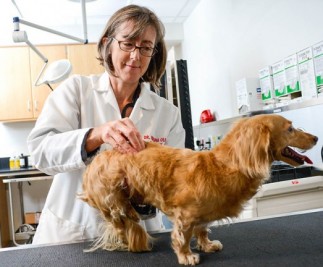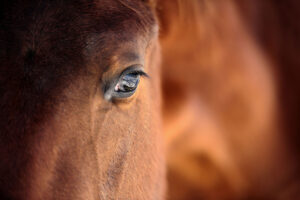June 2020 Research Roundup

A look at some of the latest published research from the NC State College of Veterinary Medicine.
Canine Spinal Surgery Approaches
Minimally invasive spine surgery is a valid technique to access the thoracolumbar vertebral canal and the ventral aspect of the spinal cord in dogs at single or multiple sites, information that could lead to effective surgical and treatment options, according to a new prospective study.
Study authors Natasha Olby, Natalia Zidan and Julien Guevar found that after the surgical approach no neurological deterioration was observed and that there are postoperative pain benefits. Veterinary Surgery published the research.
Read the study here.
Refining Wound Healing
Antimicrobial nanosilver microgel composite platelet-like particles (PLPs) show promise in treating hemorrhage and improving posttraumatic healing, according to a study published in the Journal of Biomedical Materials Research Part B.
Injectable PLPs promote clot formation and increasing clot stability, both vital to wound healing, which is often complicated by infection. The study developed the nanosilver microgel PLPs to augment the halting of blood flow, the first step of wound healing, and more effectively fight infection.
Researchers found that nanosilver incorporation does not affect PLP performance, adds significant antimicrobial activity and enhances infected wound healing outcomes. The research’s authors include Glenn Cruse and Douglas Snider.

Tracking Antimicrobial Resistance in Nigeria
A type of Escherichia coli that is one of the most common antimicrobial-resistant pathogens responsible for human infections is prevalent in apparently healthy people, chickens and in poultry farm and market environments in Abuja, Nigeria, according to a study co-authored by Sid Thakur, Lyndy Harden and Mabel Kamweli Aworh.
Globally, chicken is a reservoir for the spread of antimicrobial-resistant genes to humans. People working very closely with chickens are at a greater risk exposed to extended-spectrum beta-lactamase-producing E. coli (ESBL-EC).
Of the E. coli isolates studied, more than 32% were confirmed as ESBL producers. The prevalence of ESBL-EC was highest among both poultry workers and chickens (37.8% of isolates in both groups).
The study’s data will help inform a national action plan against antimicrobial resistance in Nigeria. One Health Outlook published the research.
Read the study here.
Discovery in Feline Disease
For the first time, researchers have documented a second illness caused by a subsequent Cytauxzoon felis infection in a domestic cat.
The report describes a cat that had seven years prior recovered by cytauxzoonosis, an infectious disease caused by tick-transmitted parasites, and then developed another illness typical of cytauxzoonosis.
Cats recovering from cytauxzoonosis can harbor red blood cell piroplasms for many years without clinical illness, but repeat illness caused by increased severity of the disease after remission, as well as repeat infection, has never been noted.
Previously, recovered cats have been thought to be resistant to reinfection and subsequent illness. Adam Birkenheuer co-authored the study published in the Journal of Feline Medicine and Surgery Open Reports.
Read the study here.
Impact of Chronic Mastitis in Dairy Cows
Chronic subclinical mastitis (CSM) reduces milk and components yield in cows, according to research co-authored by Kevin Anderson and published in the Journal of Dairy Research.
The study evaluated the effects of CSM caused by different types of pathogens in nearly 400 Holsteins. Chronic positive-culture cows have a reduction of at least 24.5% milk yield and 22.4% of total solids yield, according to the study. Mastitis is inflammation of the udder usually caused by bacterial infection.
Read the study here.

Gut Microbiota and Equine Behavior
A new study finds that gut microbiota variability is associated with certain conditions and behavior in horse athletes, suggesting a relationship between microbiota and high levels of physical and mental stressors.
The research, co-authored by Elisa Crisci and published in Scientific Reports, measured fecal microbiota and environmental- and host-related variables in 185 healthy horses raised in similar conditions.
The study found that behavioral indicators pointed toward compromised states such as hypervigilance and aggressiveness being associated with the gut microbiota.
Targeting the microbiota is a promising investigative avenue in treating elite equine athletes suffering from stress.
Read the study here.
Feline Autoimmune Skin Disease Characteristics
A new study outlines circulating anti-keratinocyte autoantibodies in cats with pemphigus foliaceus (PF), an autoimmune skin disease.
Research authors Petra Bizikova, Lisa Mamo and Britt Levy uncovered the circulating anti-keratinocyte autoantibodies in the majority of PF-affected cats studied, as well as in a small percentage of healthy and allergic cats.
The study also found that pathogenic nature and location of the antibodies suggests that the major target antigen of feline pF differs from that identified in dogs.
While such anti-keratinocyte autoantibodies have been identified in people and dogs with PF, detection in PF-affected cats had been previously largely unsuccessful. Veterinary Dermatology published the research.
Read the study here.
Strengthening Immune Response in Chickens
Administration of lactobacilli bacteria in the egg can improve antibody antibody-mediated immune responses in chickens, according to new research co-authored by Raveendra Kulkarni and published in Frontiers in Veterinary Science.
The study investigated the effects of various doses of a multi-strain lactobacilli mixture on the innate and adaptive immune responses in broiler chickens. The in ovo lactobacilli administration was also found to differentially modulate cytokine expression in mucosal and systemic lymphoid tissues in chickens.
It is common in the poultry industry for newly hatched chickens to experience delayed access to feed and water and such a delay may negatively influence the post-hatch immune system function.
Early establishment of beneficial bacteria through in ovo technology may prevent pathogen colonization and accelerate intestinal and immune system development.
Read the study here.
~Jordan Bartel/NC State Veterinary Medicine
Photography for this story was taken prior to enhanced COVID-19 safety and mask protocol established for CVM faculty, staff and students, as well as the general public. The latest information on our protocol can be found here.


